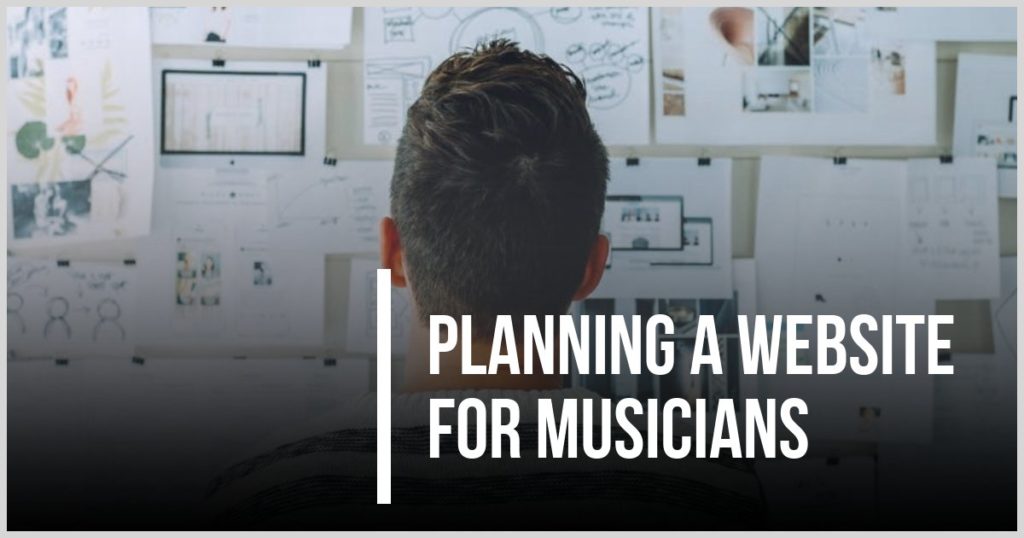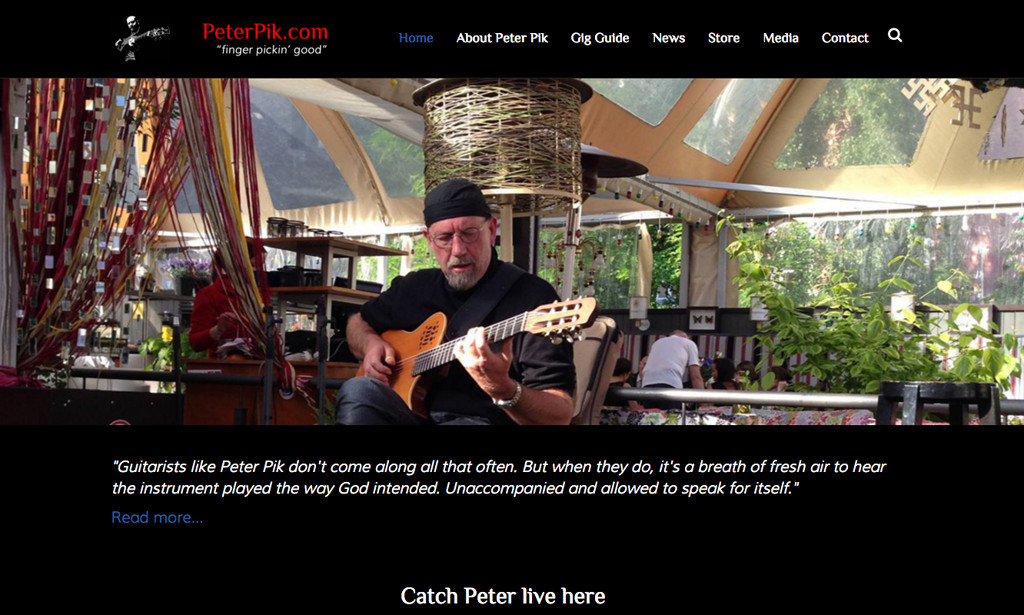
Planning a website for musicians
In this article you will learn how to avoid one of the worst mistakes that musicians and bands make with their websites, not having a plan. It doesn’t matter whether you’re building a brand new site or remodelling an existing one. Planning a website for musicians or bands isn’t an easy task without some guidelines to help. I’m going to take you step by step through the exact process I use to help my clients in designing a website that works for them. This is not a short article as there is quite a bit to do with making a proper plan. Taking the time to do this plan up front will save you a bunch of headaches though. Use this article as a checklist to help you plan and implement each step.
What’s the point?
Most bands and musicians have some sort of online presence these days. Either a website or a Facebook page and the like. If you asked them if it was working for them, sadly most wouldn’t know. We’ve covered the topic of analysing your traffic, but if you don’t know what the purpose of your website really is, how do you measure success in the first place? It’s a tired old cliche but it’s true. You have to know what you’re aiming at before you can ever hit the target.
So what’s your target? What is the purpose of your website? Not just in broad terms, but specifically. What would it have to do for you in order for it to be a success in your eyes?
If you build it, will they come?
Far too many bands and musicians have a “Build it and they will come” attitude to building a website. They just slop up a few images, a video or two and a soon to be out of date gig list and think that will attract a million loyal fans. Good luck with that. Instead of “build it and they will come”, try “build what they want and they will keep coming back”. So we now have the questions “who is they” and “what do they want”?
Who is your target audience?
This is an excerpt from our free eBook “5 Simple Things Every Musician Can Fix On Their Website In The Next Week To Make It More Effective.”
Ask yourself this question: If you could have 10 new ideal fans today, but they all had to be a clone of one of your fans, who would the existing fan be?
The best way to find that existing fan is to identify who is the one who comes to your shows, is a joy to engage with, refers you new fans, buys your music and who you would genuinely like to have more of.
Once you have identified this fan, ask yourself what they want in their relationship with you or your band and what value YOU offer in the relationship.
Now visit your website and read all of the pages, view all of the images and work your way through the site as if you were your number one fan. I want you to imagine that this website has been built specifically for you.
Ask yourself these questions:
- Does the language used on the website resonate with you?
- Are the images engaging to look at?
- Is the information relevant and interesting?
Your website should be built for your number one fan and nobody else. This is usually difficult to execute because we are afraid of potentially losing other fans. However, if we have identified who our number one fan is, doesn’t it make sense to then focus on just attracting more of them?
What do they want?
After identifying your target audience, now set about working out what will keep them coming back. What do they want from your website? It could be things such as:
- When & where you are playing live.
- Buying or listening to the music that you have available.
- General news about what you are up to.
- “Behind the scenes” information like recording your next single or scenes from your last video shoot. This type of info can really help your audience to feel engaged with you.
- Exclusive info for your “fan club”. People like to feel “part of the inside crowd”. Things like fan clubs can really help here.
What do you want them to do?
Just as important as what the audience wants from your website is what you want from it. What is it that you are trying to do right now?
It could be:
- Promoting a new recording.
- Promoting a show or tour.
- Finding new fan club members.
- Adding to your email list.
- Reading your bio or press kit.
What pages does your site need?
Look at the list of things you’ve written down in the last sections and figure out a logical way of presenting the information to the reader. What pages do you need and what should go on them? Go through the list of suggested pages below and take a note of what information you have to include on each page. A good rule of thumb is to make every page about one single subject.
The homepage is a little bit different and I’ll cover that next but for most of the other pages, they should all have a specific purpose. A typical site for a working band or musician would all have a set of pages roughly like this:
| Page | Description |
| A Home page. | Covered next. |
| An About us/Bio page. | This page should serve to quickly familiarise someone with you or your band. If you’d never met them before, what would you want them to know about you? It doesn’t always have to be a full bio but it should contain the highlights of what you’d like a new reader to know. You can include a link to your full bio or press kit here too. For some help on creating a press kit & bio check our series here. |
| A Gig Guide page. | This page should ALWAYS be up to date. It should also show you next gig at the very top of the page. Don’t make people scroll to the bottom of a long list to find out where you are playing. Most won’t. Make it easy, put it at the top. The gig guide pages in our system are automated so they will drop off the list as they pass but if you don’t have an automated system, take the time to keep it up to date. |
| A News page or Blog. | This page can be a collection of many types of posts. News items, behind the scene previews, promotion for upcoming gigs and whatever else you can think of. Again, keep this page up to date. If the last item on your news page or blog is two years out of date then your site will look forgotten & old. Don’t do it. Even a short update every few weeks will make all the difference. |
| A Music page. | This page should highlight all of your recordings again, with the latest one at the top. If you sell your music then include links to all the various places it can be bought. |
| A Media page. | This is where you can show off any good images & videos you may have. Try to include images of you in action, preferably with a crowd. People like to associate a crowd with a good time. |
| A Members page. | If you are a band or duo. Include a photo and a short description of each of your members. |
| A Shop page. | If you have other merchandise such as t-shirts etc, for sale. |
| A Contact page. | This page should have a simple list of all of your contact points such as: Email address or a form so that you can be emailed. Postal address if you use one. Your manager’s name & contact details. Your social media links. A note about this, my personal preference is that you only include these links on this page and not all over your site. The purpose of your social media presence should be to direct people towards your website, not the other way around. Include them, but only once. |
What needs to be on your homepage?
Your home page should serve as a welcome to the reader and a directory to the most important pages of your site. Bear in mind that a new reader won’t always hit your homepage first, especially if they come in from a search engine, so make sure you have very simple and consistent navigation menus on all of your pages.

It should contain enough information about all of your important pages that the reader will want to look further. For example, put your next few upcoming gigs on the homepage and then a link to your full gig guide page. Same with your recordings. Put the latest one on the homepage and then a link to your recordings page. Make sure the info on this page is always up to date and accurate. There’s nothing worse than seeing out of date gig listings right there where your latest ones should be.
The home page should also be visually appealing. It should set a mood or a tone about you that helps a new reader decide what you are all about. Make sure you include imagery that is of a professional quality too. Don’t skimp by using homemade photography. You don’t have to spend a fortune, but get someone who knows what they are doing to take and edit the images. It will be well worth whatever it costs.
Gather your content.
Now that you have a plan for what needs to be on your site it’s important to gather all of your content in one place before you begin. With my clients, I set up a folder on Dropbox that we can both access so everything is all in one place.
Here’s the content you will need:
- Your bio.
- High-quality images of you. The more the merrier. Make sure you include some of you playing live if you have them.
- A list of your upcoming gigs including venue and ticketing information
- URLs of any videos you have.
- Details of any music or merchandise you have for sale.
- Details of any sponsorships you may have.
- Press clippings.
- News items such as upcoming recordings or important events.
- A list of your awards.
- Anything else you think might be helpful.
- All of your contact points such as email & social media pages.
- Your managers contact details.
Once you’ve gathered your content and made your plan, then it’s time to implement it. You may be employing someone to do this for you or building the site yourself. Either way, having a clear plan and all of the required pieces in place BEFORE you start will help the process to go much more smoothly.
Do’s and don’ts
Here are a few tips to make the process easier.
- Ensure that you have ownership of or permission to use any images or text that you use, you don’t want anyone chasing you for copyright problems.
- Don’t try to build a huge “mega site” if this is your first effort. Start with the minimum amount you can get away with and build it up over time. I’ve seen people abandon sites before they are finished because they were attempting to build something far too big & complicated.
- Don’t be fooled into using one of those free website builders like Wix or Squarespace. While they may be simple to use, they build terribly ineffective sites where it really counts, SEO. What’s SEO you ask? It stands for “Search Engine Optimisation” and it is the likelihood that your site will be found in search engine results. These free & cheap hosts are notoriously bad for this and are really not worth it. We build all of our sites on industry standard software platforms that will help you to be found when a new reader goes looking for you.
- If you’re not sure what to do, get some help. Like I mentioned about photography earlier, people can spot amateur stuff easily. It’s the same with a web design. Don’t be frightened to get a professional involved, even if it’s only to help you.
Next steps in planning a website for musicians
As I said at the outset, planning a website for musicians or bands isn’t an easy task. There is a lot that goes into planning an effective website. Hopefully, this article has helped you to understand the importance of a plan. So, don’t just sit there, grab a notebook or open a Word doc & start back at the top of this article. Work your way through it methodically and tick off each section as you go. The end result will amaze you. You’ll have a much clearer understanding of why you need a website and what it needs to do for you to be considered a success. Then all you need to do is build your site according to your plan. Go!
If you have any questions at all regarding your plan then just leave a comment below & I’ll get back to you. If you’ve found this helpful then please share it with your musician friends.
What our customers say about Premium Band Sites:
The Silverline
“We used Mark Gibson and Premium Band Sites to create the website for our duo The Silverline.
Rudy Miranda (Australian Session Drummer)
I found it very easy to convey my thoughts & ideas to Mark when creating my website.
He’s patient and a great communicator and goes out of his way to achieve a high quality and professional product for his customers.
I’m very pleased with the results and any technical issues have been quickly addressed and fixed.
If you’re looking to create a Professional Band or Musician Website, I would highly recommend you contact Mark Gibson @ Premium Band Sites today.”
Brad Marks
“When I decided I needed a new website I was pointed in the direction of Mark Gibson.
From the start, Mark was very proactive in making sure he knew exactly what I wanted from my website and I couldn’t have asked for a better end result. Mark is very friendly and happy to answer any questions and provide any advice he can. I highly recommend anyone looking to start a website to give him a call, you won’t be disappointed.”
Herm Kovac, Drummer TMG
“When TMG (Ted Mulry Gang) decided to hit the road again the first thing we had to do was get a website up and running and our socials
Mark Gibson from Premium Band Sites came highly recommended and in no time had our website created and up and running and we were happy from day one, didn’t change a thing.
When it came to a Facebook Campaign to push our gigs Mark was there to advise us and to get in place.
I highly recommend Mark to any band or solo artist. He knows his stuff but more
George Sich
“Mark,
Thank-you for my website, I could not be more pleased with the finished product. It looks fantastic on either computer, or mobile phone, and I love the functionality, especially the seamless interaction with the e-commerce site. Very well done, sir!”
Merilyn Steele
“I recently had a new website created by Mark Gibson and I’m so happy with it! I can manage my own updates, gigs, posts and news and it is so easy. Mark was so great to work with as well and charged a very reasonable fee too. Highly recommend him if you want a new site.”






